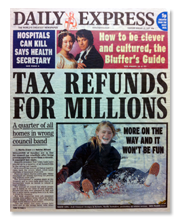 Up to 400,000 homes are in the wrong council tax band. Yet in ten minutes, at no cost, you can check 'n' challenge your banding, not only potentially slashing what you pay now but getting a backdated rebate stretching as far back as 1993.
Up to 400,000 homes are in the wrong council tax band. Yet in ten minutes, at no cost, you can check 'n' challenge your banding, not only potentially slashing what you pay now but getting a backdated rebate stretching as far back as 1993.
Thousands have already tried this and succeeded, and stories of payouts in the £1,000s are commonplace. This is a step-by-step guide to see if you can join them.
In this guide
Quick Links:
Why you may be overpaying
Many homes are in the wrong council tax band, and have been since 1991. Here's the story:
 nce upon a time, way back in 1991, in time for the launch of its new council tax system the Tory government needed every house in the land to be put in a valuation band. But time was short, and the job large, so the people in charge asked estate agents and others to help.
nce upon a time, way back in 1991, in time for the launch of its new council tax system the Tory government needed every house in the land to be put in a valuation band. But time was short, and the job large, so the people in charge asked estate agents and others to help.
Yet even with all the estate agents' help, they didn't have time to get the detailed information together, so they set about doing it quick ly by pairing up and driving down countless streets, allocating each property a band with just a glance. Not only did they never get out, in the industry it became known as “second gear valuations” as they never even stopped their cars.
ly by pairing up and driving down countless streets, allocating each property a band with just a glance. Not only did they never get out, in the industry it became known as “second gear valuations” as they never even stopped their cars.
Many years passed, and still nobody came to rescue the poor valuations in England and Scotland, though the Welsh assembly reassessed all homes there. So the flawed old valuation still dictates much of the kingdom's banding, which is why you could be paying more than your neighbour even though you live in exactly the SAME size house.
This may sound like a fairytale, but every word is true.
How much can you expect to get?
 This is no chicken feed solution. Get your banding decreased and as well as paying £100 - £200 less each year, the repayment should be backdated to when you moved into the property; as far back as when the tax started in 1993. Here's a few examples of some MoneySavers' success stories:
This is no chicken feed solution. Get your banding decreased and as well as paying £100 - £200 less each year, the repayment should be backdated to when you moved into the property; as far back as when the tax started in 1993. Here's a few examples of some MoneySavers' success stories:
"Last week got the letter from VOA saying we were being reduced to an E effective from when we moved in in August 2000. Next day got the letter from the Council stating the same and that the refund was £2,369. Money was paid into my account yesterday. Total time less than 4 weeks."
"We successfully followed the system and appealed against our council tax banding; half our street was band E and the rest band F, yet the houses are around the same in value. They sent someone to re-evaluate our house within a fortnight. We were reclassified to an E and got a cheque for over £2,000!"
"I telephoned my local Valuation Office as I'd discovered that my neighbour has a lower band then me, yet the house is exactly the same. They reduced my banding almost overnight, and today, almost six weeks later they've put £1,500 - yes £1,500 - into my bank account. "
Council Tax Cashback hits the news!
 When we first launched this system in 2007 it hit the headlines in a big way, making the front page of scores of newspapers on the same day Martin presented a prime time ITV1 show on how to do it.
When we first launched this system in 2007 it hit the headlines in a big way, making the front page of scores of newspapers on the same day Martin presented a prime time ITV1 show on how to do it.
The Government's Valuation Office Agency website, which is a key part of the technique, crashed for a week under the traffic.
We believe over 3 million people have now tried this system and the successes have been huge.
In 2008 the Conservative party launched an attack on labour saying it believed 400,000 homes were in the wrong bands and in May 2009 the Telegraph suggested over 130,000 had had their band lowered due to it.
Read how others fared
If you've succeeded please report your council tax cashback successes and if you're new, do feel free to read others' stories there.
Watch the video guide
Courtesy of It Pays To Watch, Five, Sept 2008
Council Tax Reclaiming: Step-by-step
Follow the steps below and you could see a payout in as little as a month:
 The Neighbours Check
The Neighbours Check
 By far the most important step is to find out if your band's higher than neighbours' in similar or identical properties. While you could simply ask them, there's no need.
By far the most important step is to find out if your band's higher than neighbours' in similar or identical properties. While you could simply ask them, there's no need.
The band of every house in England, Wales & Scotland is public info via the following websites.
In England and Wales use the |
In Scotland use the |
So first check your band, and then your neighbours'. Do ensure the properties are as close as possible in size and value though. Sadly, the sheer scale of the database means a few properties are missed off it, if that happens either speak to neighbours directly or contact the council and ask why.
If neighbours in similar properties are in a lower band than you… then you may have a claim.
 The Valuation Check
The Valuation Check
 A second useful step is to estimate what your house was worth back in 1991 as that's when the council tax bands were defined.
A second useful step is to estimate what your house was worth back in 1991 as that's when the council tax bands were defined.
This CAN'T be used as evidence in appeals, but it enables you to check out various house prices and is an important belt & braces test that you're on the right track if you decide to appeal.
First - value your house
If you bought your house after 1991, you can simply use its price and date of sale to do this. If you rent or bought earlier you'll need to find an estimated price.
It's also worth doing this with similar neighbouring properties to check there are no anomalies.
Go to free house price websites
To quickly find a price, use one of the websites that offers historic sales price information for free. These include Nethouseprices, Zoopla and RightMove.
Simply put in your street and it'll tell you the prices of all properties sold in it since 2000. For more details on valuation tools, read the full free house price valuations article.
Note down the price and date
Find the most recent sale price of a similar property to yours in your street. Now note down both the PRICE and the DATE OF SALE
Once you have that information, you can use it to estimate what your house would've been worth back in 1991 and what band it is in. We've built a calculator to do it for you below (find out how to do it manually).
To do this go to the Nationwide House Price Calculator. This is actually designed for people to put in their house price when they bought it, and work out what it's worth now. Yet it is possible to use it in reverse to get a rough value back in 1991.
How to use the calculator
A. Scroll down the page to the calculator
B. In 'Property value' note the sales PRICE from earlier
C. In 'Valuation date 1' enter the DATE OF SALE from earlier
(do ensure you put down which quarter of the year it was).
D. In Valuation date 2' enter 1991, and Q2
E. Select your region from the drop down list
F. Click 'calculate the results'
The results, rather strangely, appear just above the calculator. E.g.
A property located in the North West which was valued at £170,000 in Q2 of 2010, would be worth approx. £66,904 in Q2 of 1991. That's equivalent to a -60.64% change
You can then compare this to the table below to see what band you should have been put in, based on that house price.
This is only a very rough indication, but still an important safety check. You may be in a higher band than neighbours because they're in the wrong band not you. In that case, if you appeal and stay the same band, yet theirs' is increased, it won't make you popular. This additional check helps mitigate the chances of that happening.
If this test also indicates you are in too high a band, it's worth checking how far away you are from the band you're actually in – as part of deciding whether to appeal. Use the table below...
| Band | ENGLAND 1991 Property Value | SCOTLAND 1991 Property Value |
|---|---|---|
| A | All properties under £40,000 | All properties under £27,000 |
| B | £40,001 - £52,000 | £27,001 - £35,000 |
| C | £52,001 - £68,000 | £35,001 - £45,000 |
| D | £68,001 - £88,000 | £45,001 - £58,000 |
| E | £88,001 - £120,000 | £58,001 - £80,000 |
| F | £120,001 - £160,000 | £80,001 - £106,000 |
| G | £160,001 - £320,000 | £106,001 - £212,000 |
| H | over £320,000 | Over £212,000 |
Don't miss out on updates to this guide Get MoneySavingExpert's free, spam-free weekly email full of guides & loopholes
 Are you in the wrong band?
Are you in the wrong band?

At this point, we need throw in a serious warning, challenging your band is not something to do speculatively without the checks, for one simple reason...
You can't ask for 'my band to be lowered', only for a 'reassesment' which means your band could be moved up as well as down.
In some extremely rare examples it's even possible that your neighbours band could be increased.
This is why it is crucially important you do BOTH of the checks and are especially careful if you've added an extension or something that increases your property's value. In terms of you being eligible for money, by far the most important check is the Neighbours' Check, yet the secondary Valuation Check is useful for seeing whether yours is too high or your neighbours are too low.
Use the table to see how strong your case is to help you decide if it's worth it.

 Challenge!
Challenge!
 If you're convinced that your property band's unfair, it's time to challenge your band.
If you're convinced that your property band's unfair, it's time to challenge your band.
Write to the relevant contact below. You'll be told how your band was decided, and have the opportunity to explain why you believe it is wrong and how it should be altered. Alternatively, you can appeal online via the VOA or SAA.
In England and Wales |
In Scotland |
The Directgov site (England and Wales only, for Scotland contact your Local Assessor) helps explain how to go about challenging your council tax band. You can either contact the VOA directly or check your band by entering your postcode and selecting your address from a list. Then click on the link asking if you think your council tax banding is wrong and you'll be given the option to fill out a checklist which suggests reasons you could challenge.
Remember the 'formal challenge checklist' is more a safety check before doing the challenge. It's got very limited value in your appeal. However, if you source actual sales prices from around 1991, that's stronger evidence.
Been told you can't challenge it?
Many people get told they can't challenge their banding, as they've been in the property more than six months. If this happens to you, don't worry, it's common and there's usually a way round it.
That rule is simply a standard procedure, yet more importantly the Local Listings Office has a legal duty to ensure all properties bands are correct, and that means, if pushed it should investigate your representations and alter the Valuation List if it believes it's required. This also applies if your re-valuation reason isn't on the official list.
Therefore if you get told you can't appeal, write a letter politely explaining, "I am writing to tell you I believe the council tax banding list of my property is incorrect, my house is in the wrong band, and I ask that you investigate that it is corrected."
This has and does work, though there are no guarantees. It can need some perseverance and you may only get a band change going forward but no backdated payout. See the council tax successes thread for details of many people who've pushed through this.
If it still doesn't help you could complain to the Adjudicator's Office which covers complaints about VOA administration (such as mistakes or misleading advice).
If your appeal's rejected
If you challenged your banding and your enquiry was rejected, you've got three months to appeal to the Valuation Tribunal. The Directgov site provides further details on appealing a decision (reasons to appeal can be found on the 'What to do if you disagree with your council tax banding' leaflet).
Yet remember, check 'n' challenge isn't a guaranteed system. The two checks are a strong indication that you should consider challenging your banding; but that doesn't mean it will always actually be lowered.
We often get emails from people saying “I went through all the steps, they investigated and turned me down – what now?”. The truth is if that happens, then unless you've a very compelling reason, unfortunately it's probably time to give up.
What to do if you succeed
Expect to have your band lowered and ensure you get a backdated rebate from the moment you moved into the property (or 1993, whichever is later). You may also want to consider contacting previous occupants as they should be entitled to a pay out too.
Please feedback your story; the more info the better I can finesse this system. Please report your council tax rebanding successes.
Council tax rebanding Q&A;
Here are a few commonly asked questions. If yours isn't answered below, take a look at the forum discussion.
Do payouts mean everyone else in the area will pay more?
According to Tony Travers, local government specialist from the London School of Economics, the obligation is on central government to make up the cost of substantial rebanding. The exact relationship is complex, but it does mean the cost is spread. Rather bizarrely, some individual councils may actually gain from this, as there are bigger subsidies if more people are in lower bands.
Yet let's put it in perspective; the whole point of this is to get your money back for council tax you've been overpaying for years. Fundamentally the more people who get revalued the more pressure there will be on the Government to do a nationwide revaluation and ensure everyone is paying a fair amount.
Why doesn't this apply to Wales & Northern Ireland?
Northern Ireland uses a completely different system to council tax so this is irrelevant. Wales does have a council tax system, but a nationwide revaluation has been done far more recently, and thus errors are less likely and less longstanding - so we have focused this guide on England and Scotland only.
My property usage has changed, can I still apply?
The bandings were assessed on 1 April 1991, and haven't been reassessed since (except in Wales) so of course for many people they're out of date; e.g. if you've had a nightclub built next to your house or it's been turned into flats (though you could also be paying too little if your home's improved!) or property values in your specific neighbourhood have dropped compared to elsewhere.
In fact this is the traditional reason for rebanding your home, and until we launched the check n challenge was the basis for the vast majority of appeals. So yes, in these circumstances you can challenge your band.
What does council tax get spent on?
Council tax is collected to pay for local services such as policing, education and waste management. In 1993, England, Wales and Scotland saw it replace the notorious 'poll tax' (Northern Ireland still uses the even older 'rates system'); though it has been widely debated if the current system is much more reasonable.
What type of properties have to pay council tax?
Be it a house, flat, mobile home or houseboat, council tax is applicable to all personal dwellings; but don't assume all households pay the same amount.
Can I do it if I rent/am a tenant?
You pay council tax if you live somewhere, regardless of whether you are the tenant or owner. Which means if you rent it's certainly worth going through the system to see. However before you challenge your band, courtesy dictates you should discuss it with your landlord first.
Are 'second gear valuations' for real?
To rush through the valuation in 1991, it was often outsourced to relevant bodies such as estate agents They were simply given a list of the size of properties and asked to assess them from the outside. Within the industry it became known as 'second gear valuations', as quite literally they stayed in their cars and drove past in second gear allocating bands.
As one estate agent confessed to me, "we were on deadline, had to do 400 homes a day, working off a list. I was in a rural area, so often we couldn't even see the properties and just had to do a best guess. The system would've worked if the rebanding was done every five years." Yet it wasn't: bands haven't been revalued since, so it's no surprise so many are wrong.
What should I do if I think I'm in too low a band?
There is no obligation on you to do anything or tell anyone. Whether you want to declare is a matter for you and your ethics. Though even if you do – there's no guarantees it will go up.
Don't miss out on updates to this guide Get MoneySavingExpert's free, spam-free weekly email full of guides & loopholes
Ensure you're getting council tax discounts
Council tax band changes aren't the only way to save money. Under certain conditions you're able to get a discount on your council tax bill, or possibly be exempt altogether. If any of the following circumstances apply to you, contact your council immediately as you need to apply for discounts; they're not deducted automatically.
 Are you a student living alone or with other students?
Are you a student living alone or with other students?Full time students don't pay council tax, thus two, three or ten students living together don't pay.
Do you live alone?
The full bill assumes at least two adults are living in a property, so if you live alone, or are the only adult (disregarding anyone in full time education), you're eligible for the single person's discount meaning a 25% reduction. Bearing this in mind, inform the council as soon as possible if your circumstances change through a housemate/lodger leaving, becoming a student, separation, divorce, or the death of a partner/spouse.
Do you live in a mixed student/non-student household?
Where a student lives with a non-student, the student is disregarded so the council tax bill is reduced as though just a single person lives there.
If you're contemplating this scenario it does pose a slight moral dilemma; is it fair for the non-student to pay the entire 75%? Should the student contribute? If the non-student lived with another non-student they'd only have to cough up 50% each. Alternatively, if the student lived with another student they wouldn't have to pay at all. Perhaps split the difference with one paying 62.5% and the other 12.5% of the full amount
Either way, the legal stance is that full time students are not jointly and severally liable for the bill if the non-student doesn't or can't pay. So legally students don't have to contribute.
Are you on a low income?
If you're on a low income (and don't have more than £16,000 in savings) you may be able to receive council tax benefit to help ease the burden. The 5 Minute Benefit Check-Up Article will assess your eligibility and suggest if you may be entitled to any other financial support.
Your bill could also be reduced by applying for the Second Adult Rebate if you share your home with someone who is aged at least 18, (they can't be your partner) on a low income and not paying rent or council tax themselves. This reduction could save you up to 25% off your bill.

Is your property being renovated or is it empty?
For unoccupied and unfurnished properties which need or are undergoing major repair work to make them habitable, you can claim a Council Tax exemption for the first 12 months, provided the previous owner didn't. For any length of time after that, you may be entitled to up to a fifty percent discount off the normal rate, or no discount at all, depending on which council's area you're in. This is because each council is free to decide what "long term empty" rate it wishes to charge after the exemption has ended.
If your property is unoccupied and unfurnished but not being renovated, the council may grant an exemption for up to six months.
Do you have a second home?
You're liable for the full council tax on a second home, however you could receive a discount between 10-50% at the discretion of the appropriate council.
Are you willing to have cavity wall insulation fitted?
As an energy efficiency incentive, a possible one-off council tax rebate of up to £125 is available to thousands of households (only in specific UK local authorities). To get it, you must agree to have British Gas install cavity wall insulation at the cost of £175, although you don't have to get your gas and electricity from British Gas to do it. Of course this means even with the rebate there's an overall cost, but this should be more than made up for by reduced energy bills (also see Energy Grant Grabbing).
Before doing it, check your eligibility for an insulation grant via the British Gas website; you can't receive a grant as well as take part in the council tax rebate scheme so if you have the choice, opt for the grant; it'll save you more. If not, check the list to see if your council is participating, and if it is, contact it.
Do you have a disability or are you a carer?
Reductions for disability are available e.g. if for accessibility purposes you have to live in a large home or you've had to make modifications. You could see your bill decrease by one band.
Discounts are also available for occupiers who provide/receive care elsewhere.
Further information on council tax discounts and exemptions, and a guide to claiming these can be found on the Directgov website.













